|
[Previous Page]
THREE BUSY PLACES:
HALIFAX, BRADFORD AND LEEDS.
(From THE
SUNDAY AT HOME,
1898-99.)
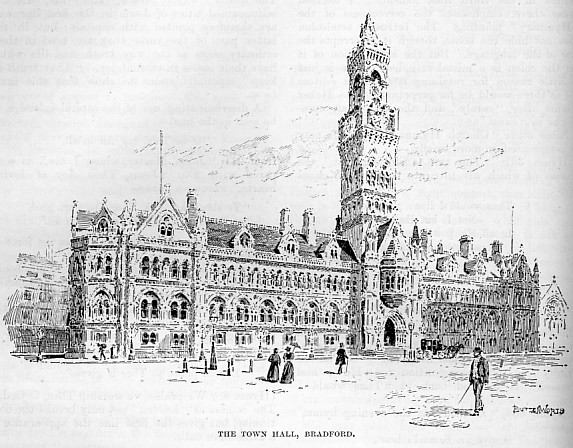
IN
visiting those places which are pre-eminently "manufacturing towns,"
one's attention is too apt to be concentrated on their commercial
and present-day aspect, forgetful that this can be scarcely
understood without
some regards being thrown upon their deeper and wider foundations in
the past. When, therefore, our steps were lately led through these
great centres of industry―Halifax, Bradford, and Leeds—we resolved
to
approach them exactly as we should any cathedral or university town,
thinking first of the historic and human relations which have
developed or directed their present industrial pre-eminence.
Halifax. There is something rather quaint about Halifax. It still
has many corners which might belong to any sleepy provincial town. The hills, too, "stand about Halifax" so closely that its streets
literally clamber up
them, and one of its special features are its flights of stairs, off
whose wide "landings" one turns into little paved quadrangles, one
above the other, offering, at least, safe playing-ground for the
children, since no
wheeled vehicle can intrude. The "closes," too, are of similar
construction. Between the dwelling-houses of any of the main
streets, one sees here and there a flight of twelve or twenty steps
not wider than those of an
ordinary house, and on mounting any of these, one again finds a
little paved quadrangle, some of whose inhabitants are sure to come
out to gaze with interest on the intruder. Many of the houses in
the east end of the
town, near the Great Crossley Mills, enjoy magnificent prospects,
and their bright windows, curtained and sometimes beflowered, give
the great "lands" of flats a cheery and comfortable appearance.
Halifax is an old place, for coats of arms in the parish church tell
us that there were "vicars of Halifax" in 1274. The parish church
is a very stately building, with some singularity of construction,
and with parts of
great antiquity, though the whole was restored by Sir Gilbert Scott
in 1878. Its interior is dark with black oak, and it might be built
of black stone, so systematically and thoroughly has the grime of
the atmosphere
covered it. Its most interesting monument is that of Robert Ferran,
Bishop of S. Davids. He was a native of Halifax, and perished at the
stake in Carmarthen in the last year of Queen Mary's persecution. So
stout of
heart was he, so firm in his faith of divine upholding, that his
last words were: "If I stir through the pains of my burning,
believe not the doctrines I have taught."
The name of Halifax is said to be derived from the old church
roads―Holy-ways―fax being the Norman for such paths. Popular
legend, however, asserts that it comes from holy face, deriving from
a representation of the
head of John the Baptist, which in the remote past was kept in the
chapel of the parish church, and was the object of much devout
pilgrimage.
In one or two of the older houses in the heart of Halifax, a little
fine oak carving is still to be found. We may note especially a
certain mantelpiece bearing date 1581. Above it is to be found the
arms of the well-known
Yorkshire family of Savile, one of whom, Sir Henry Savile, was Queen
Elizabeth's tutor in Greek and mathematics. He is further
distinguished for bringing out a magnificent edition of St.
Chrysostom's works. The
production of this is said to have cost £8000.—the pride of
litterateurs of that period being in the expense of their labours,
and not in their pecuniary profit. He was assisted in his colossal
task by the learned Dr. Boyse,
who was one of the four scholars who were hired by the Stationers'
Company to revise translations of the "Apocryphal Books" for an
honorarium of thirty shillings per week while their task was
proceeding.
Lady Savile was jealous, as wives sometimes are, of her husband's
absorption in his studies. Poor woman! She said she wished she was a
book, as she might then receive a little attention, and all the
comfort her
husband gave her was the playfully ungallant answer that "he would
fain have her an almanack that he might change her every year." On
another occasion she threatened, perhaps not quite seriously, to
burn
Chrysostom, declaring that her husband's studies were killing him.
"That were a great pity," remarked the gentle reviser Boyse. Her
response gives us the key to the whole position, for the ignorant
cannot be the
sympathetic: "Why, who was Chrysostom!" she asked. "One of the
sweetest preachers since the Apostles' time," was the answer. "Then
I would not burn him for the world," said she, instantly rebuked. Had Sir
Henry condescended to give some serious "attention" to the mind of
the living woman beside him, who knows but it might have shed some
light on his dusty tomes, as it would have certainly supported him
by
interest and admiration.
In the time of the Wars of the Roses, Halifax was a mere village of
twelve or thirteen houses. But soon after, in the course of the
reign of Henry VII., Flemish artizans and weavers settled in it, and
the growth of its
importance began.
A strange, fierce, old law had from time immemorial existed in the
district of Halifax (it can be traced to 1280), whereby any person
in the district, accused and convicted of felony to the amount of
"thirteenpence
halfpenny," was beheaded in the market-place on one of the next
market days. The engine of execution was a sort of rude guillotine,
and every spectator was expected to take hold of the rope, "or to
put forth his arm
so near to the same as he could get, in token that he is willing to
see justice executed," so as to cause the axe to descend on the neck
of the culprit. Nay, if the theft had concerned ox, sheep, horse, or
cattle, then
even the animal itself had the rope fastened to it, and was made to
join in the act of doom.
The "trial" was conducted under the supervision of the lord bailiff
and sixteen burghers. Accused, accuser, and the subject of theft,
were brought forward and confronted with each other. No oaths were
taken, but
evidence was adduced. If deemed sufficient, and a market was going
forward, the offender was instantly executed. If it was not market
day, he spent the interval in the public stocks. On the other hand,
if the evidence
failed to establish the charge he was at once set at liberty. A
thief who succeeded in escaping arrest till he got outside "the
liberty of Halifax," was safe; he could not be brought back. But if
he ever returned, he was
liable to the same punishment. There is a cruel case recorded
wherein a man who had spent seven years of honest living outside
this dread boundary, was, on his coming back, made to suffer for his
old offence. A
certain local phrase—"I trow not, quoth Dinnis,"— originated with
another culprit, who succeeded in escaping after he had been
condemned, and being met as he went away by country folk who asked
if one Dinnis was
not to be executed that day, he answered, "I trow not," and passed
on his road.
It can be readily understood that with an increasing town
population, together with the growth of manufactures, whose nature
and bulk offered more temptation to petty theft than did a fine
young bullock or some logs of
wood, these summary executions soon grew very numerous. Between 1541
and 1650, forty-nine people were thus put to death in the
market-place of Halifax, the greater number of these executions
occurring in the
reign of Queen Elizabeth. But in this respect, despite its own
special severity, Halifax is not likely to have been worse than any
other part of England, since during the thirty-eight years of Henry VIII.'s reign, no fewer
than seventy-two thousand perished on the scaffold.
The last Halifax execution took place in 1650, when the bailiff
received warning from headquarters that if another occurred he would
be held responsible for it. As capital punishment for theft and
allied offences persisted
till the second quarter of the present century, it is evident that
the objection to the Halifax arrangement was not against the
severity of the sentence, but against the summary and
self-constituted court which
pronounced it.
It is said that the "engine" employed on the Halifax criminals
furnished Earl Morton with the model for his famous "maiden," with
which he wrought such havoc in Scotland, until he himself finally
perished in her deadly
embrace.
The worsted and carpet trades form the staple of Halifax industry. Crossley's carpet works, the largest in the world, employ five
thousand hands. We found the work-people, whom we met pouring out
through the great
gates, very ready to give information, and apparently proud of the
extent and importance of their mills. The women, clean and
picturesque with their shawled heads, were pleasant mannered and
comely. One observed
that many of these "factory girls " were well on in "the forties,"
explaining the phrases "t'owd lad " and "t'owd lass," so constantly
heard in Yorkshire. We were told that they earn, mostly by
piecework, from 15s. to
20s. per week.
The centre of the town is very concentrated with its bright
well-stocked shops, fine new market-place, and handsome places of
worship. The newer part of the town, towards Skircoat, contains
pleasant residences and
large, well-timbered gardens.
Halifax has four parks. Savile Park, by Skircoat, is a large open
moor. Shroggs Park, and the Akroyd Park, both lie to the east of the
town, the latter contains an art gallery and museum, and a branch
library with
fifteen thousand volumes, and on its margin stands the fine modern
church of All Souls, erected by Mr. Edward Akroyd. The People's
Park, containing upwards of twelve acres, is not far from the centre
of the town, and
is the gift of the late Sir F. Crossley, the town contributing £300
annually for its up keep.
Sir Joseph Crossley's former residence has been converted into a
public library with 28,000 books, about 350 being issued daily. There are also the libraries of the Literary and Philosophical
Society, and the
Mechanics' Institute, the former containing 20,000 volumes, the
latter 12,000.
Halifax is also well equipped educationally. It is said that about
two-thirds of the children come under the School Board. The Blue
Coat School provides for sixty boys and girls, and its almshouse
shelters twenty-four
old dames receiving a dole of five shillings weekly. Each of the Crossley Brothers, Francis and Joseph, made special provisions for
old folks. Halifax further rejoices in a very unusual institution
founded from money left
to trustees by the late John Abbott. This is the Abbott's Ladies'
Homes, and consist of twelve four-roomed cottages, each of whose
elderly or invalid inmates receives an allowance of fifty-two pounds
per annum.
The population of Halifax is now about 84,000. It is said that its
workhouse has room for 700 inmates, exclusive of vagrants.
Nothing strikes one more in travelling through Yorkshire than the
number of its towns, evidently of considerable magnitude and
importance, whose names are quite unfamiliar outside the
manufacturing and commercial
world.
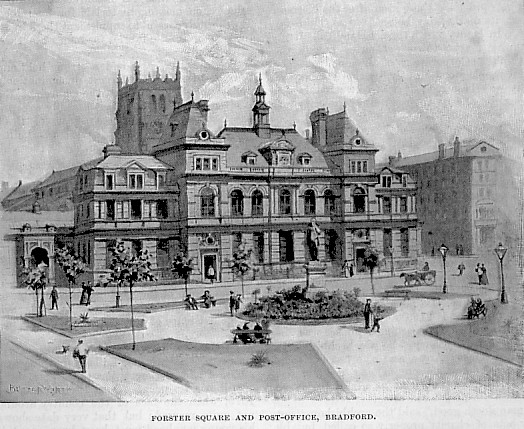
Bradford. As we approached Bradford, one of its citizens, who was
our fellow-traveller, proudly assured us that we should find there "some of the finest buildings in Great Britain," he "should not like
to say how many
storeys high." The description did not greatly cheer us, nor did the
appearance of Bradford much attract us. One's impression is that it
is all mills and business, and one wonders where the people live and
indeed where
they are, for in the intervals of going to or from work, the
streets, many wide enough, but all gloomy through the height of the
smoke-blackened buildings, seem well-nigh deserted.
The residential suburbs are rather remote from the centre of the
town, and only to be reached by wide, but rather unattractive
thoroughfares, off which are narrow openings mostly filled with tiny
houses. Here and there,
however we find signs that, at no remote period, the "better classes" lived nearer to the heart of things. These signs are little
cloistral squares looking not unlike the precincts of convents or
almshouses. The dwellings
here, without being large, are such as would have met the demands of
well-to-do people half-a-century ago. Many of these, now inhabited
by people in some way connected with "social work," are nicely
appointed and
put the best face on matters. In the little old squares one may
still see the forgotten notice boards of a once exclusive gentility,
proclaiming that anybody found walking there, except when going to
the houses, "will be
prosecuted."
But though the Bradford of to-day shows few traces of antiquity,
both it and its typical industries have a very early origin. "The
parish of Braforthe" is mentioned in very old charters, and woollen
cloth making was
practised there soon after the Norman Conquest, its market-day being
fixed as Thursday in 1256. In Henry VIII.'s time, Leland calls it "a
praty quick market-town." Charles I. sold the manor to the
Corporation of London,
but the Bradford people stood stoutly by the Parliament. Twice it
was besieged; it was converted into a royal garrison and its then
existent prosperity was well-nigh destroyed.
In those days nearly every house in Bradford had its garden, and
unsophisticated country smiled around. The situation is said to have
been peculiarly beautiful, at the junction of three smiling valleys.
When peace was again restored to the kingdom, Bradford took up the
weaving of worsted—the peculiar woollen thread which gets its name
from having been made by Flemish artizans who settled in the village
of
Worsted, Norfolk. But the tremendous influx of labour and commerce
which makes one authority say that "The real energy of Yorkshire
settles in Bradford," only came in with the present century. Its
population was
then little over 13,000, now it is 216,000.
The Bradford of the gardened houses was the birthplace of John
Sharp, who was archbishop in the reign of Queen Anne, and who has
left some practical considerations on "Doing good in our lives,"
which are every
whit as useful to-day as they were when he uttered them.
"A man doeth good," said the archbishop, "not only by acts of
charity properly so called, but by every courtesy that he doth to
another . . . . by contributing in any way to make the lives of others
more easy and
comfortable to them . . . . A man also doeth good when he makes use of
that acquaintance or friendship or interest that he hath with others
to stir them up to the doing of that good, which he, by the
narrowness of his
condition, or for want of opportunity, cannot do himself. This is a
very considerable instance of doing good, how slight soever it may
seem: the man that exercises himself this way is doubly a
benefactor, for he is not
only an instrument of good to the, person or persons for whom he
begged the kindness or the charity, but he does also a real kindness
to the man himself whom he puts upon the benefaction, for God will
not less
reward his good will for being excited by another . . . . We
do good when we so carry ourselves in all the relations in which we stand as
the nature of the relation requireth . . . . We also do good by an
honest and a diligent
pursuit of our calling and employment."
Bradford has erected statues to the politicians Sir Robert Peel, and
"Education Forster," to Oastler, the friend of factory children, and
to Sir Titus Salt, who is certainly entitled to ample recognition
under Archbishop
Sharp's last definition of a "doer of good," since Salt's shrewd
recognition of a use for what had been hitherto regarded as a waste
product―the wool of the alpaca—for many years furnished employment
to hundreds of
thousands.
A significant hint as to the substantial damage which may be
inflicted on industry by heedlessly varied fashions is found in the
fact that Bradford soon proved that its labourers could have no
reliance on making
materials for feminine wear. It was wisely careful to supplement
these by the production of textile fabrics for men's use, furniture,
cloths, and braids.
Wesleyanism early laid a strong hold on Bradford, and remains its
largest denomination. The Independents follow next, the Church of
England itself coming third, which is possibly explained by the fact
that during
twenty years of Bradford's most rapid growth no new church was built
there. That apathy has since vanished, the churches have multiplied,
and Canon Bardsley, the late vicar, has done good and active
service. On the
other hand, Nonconformity in Bradford, and even in Yorkshire
generally, is said by some to be growing rather lax and apathetic;
and to have lost not only the warmth and fervour of its first love,
but also something of its
moral and intellectual backbone.
Bradford is well equipped with educational institutions and
societies. It has five parks, skirting the town, four of them being
of considerable extent.
The Yorkshire musical faculty finds evidence in the existence of
eleven musical unions in Bradford.
Further, the Bradford of this century—the Bradford of upspringing
mills, of machine-smashing mobs, of labour competition, of poverty
and gloom —still has its poet! True, Preston was born in 1819, when
the face of the
country around was not quite marred; but that very date shows that
his young manhood must have been spent in the days of Bradford's
fiercest and angriest struggles. He was a true poet, writing of
his "ain folk" in their own homely tongue. In his verse he often embalms
fine old customs which the hard tread of modern days must soon wear
out. For instance, in the "Sacred Drawer," where the mother is
turning over
the little relics of her dead child, she wails
"I canna turn t' key wi' my bairn outside,"
an allusion to the tender old West Riding custom which left the
house door unlocked for seven nights after a funeral—a usage which
could scarcely be practised in the Bradford of to-day.
We venture to quote a few of Preston's verses, interesting in
dialect, and also as showing that the same love that is found in
huts where peasants lie, does not forget the attics of the factory
worker.
The middle aged man is thinking of his boyish love.
"I'd leet of a sun 'at has long since set;
I see t'chapel o' Primrose Brow;
An' what friends on a Sabbath day there have met,
That forever are pairted now.
"They come an' they smile an' away they pass,
But they allus leave one i' view—
A poor little fatherless country lass,
'At once sat i' t'singer's pew.
"Well, this world gets as cou'd and as hard as steel,
An' at times I feel fain Shoo's dead;
For Shoo'd hard to work at her loom an' her wheel
For a morsel o' honest bread.
"More nor twenty years Shoo's been dead an' goan,
But wherever ma lot may be,
When 'thouse is all husht an' I'm left aloan,
She allus comes back to me.
"I've wish't 'at I telled her by t'garden door
How deep were my love an' true,
For t'friends o' that orphan were few an' poor;
But noa matter—I think Shoo knew!" |
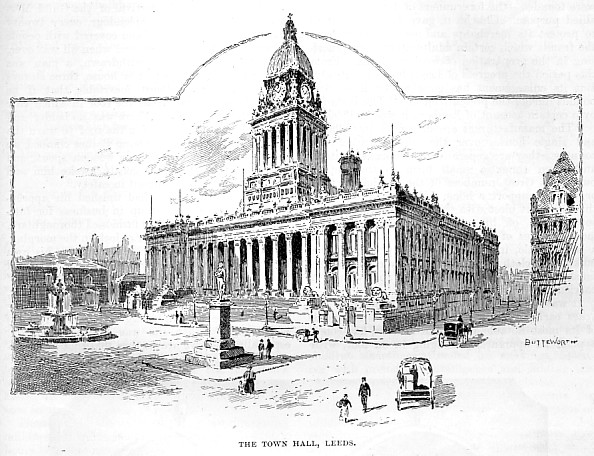
Leeds. Bradford and Leeds are as closely associated in their past
history as in their present commerce. Both are in the district which
was dominated by the great Norman family of the De Lacier, who
received from
William the Conqueror the gift of one hundred and fifty Yorkshire
manors, and who probably built that castle of Leeds which was
besieged by King Stephen, during his desperate struggle with the
Empress Matilda,
filling the land with slaughter and dismay for nigh twenty years. One writer says of the misery of that period "many abandoned their country: others forsaking their houses built wretched huts in
churchyards, hoping for protection from the sacredness of the place. Whole families,
after sustaining life as long as they could by eating herbs, roots,
dogs and horses, perished at last with hunger, and you might see
many pleasant villages
without one inhabitant of either sex."
A little later Leeds Castle was one of the prison houses of Richard
II. on his way to his mysterious end at Pontefract. The castle has
utterly disappeared; it is believed to have been situated on Mill
Hill.
Leland, who was the king's antiquary in 1533, alludes to Leeds as "a pretty market town, subsisting chiefly by cloaking."
Leeds suffered sharply in the Civil War, but still more in the great
plague, which had so baleful an effect on its activities, that it is
said grass grew over the public highways. Nevertheless, it presently
got its share of the
extraordinary advance made by the business of the whole kingdom
immediately after the Restoration—which advance, by the way, is said
to have been really due to wise measures taken during the
Commonwealth! For
Cromwell had called together what was really our first Board of
Trade, to consult how commerce and navigation could be best promoted
and regulated. Thus one sows, and another—haply his enemy—reaps,
but good
work always remains good, and worthy workers ask no other reward.
It was about this time that Leeds Cloth Halls were founded—the
forerunners of later edifices of allied purpose. Charles II. gave
Leeds a charter to protect its merchants and manufacturers from the
frauds which certain
adulterators were practising in the preparation of woollen cloths. From this period the progress of Leeds has been steady. But its
enlargement has gone up by leaps and bounds during the present
century. This is
shown by a certain account of Leeds as it was in 1806.
"The manufacturers are dispersed in villages and single houses over
the whole face of the country; they are generally men of small
capitals, and often annex a small farm to their other business. Great numbers of the
rest have a field or two to support a horse and a cow, and are for
the most part blest with the comforts, without the superfluities of
life. Of late years, however, manufactories of cloth have been
established on a larger
scale, in which the whole process of the making of cloth from the
raw material to the finishing of the piece ready for the weaver is
carried on."
It was to such a Leeds as this that, some ten years earlier, Edward
Baines, destined to be one of its most notable and useful citizens,
had come, a printer's apprentice, trudging in on foot, with a trifle
of money in his
pocket and a bundle of small possessions in his hand. He arrived,
too, with something like an aroma of misfortune hanging about him. For he had been apprenticed in a neighbouring town, and work had
proved so
slack, that the closing years of his indentures had been given back
to him, and he had come to Leeds in search of some master willing to
take up the remnant. But there was courage and nerve and resource in
the lad,
who had already been the hero of the following curious occasion.
"At Preston, at a festival of the Guild Merchants, held with great
splendour every twenty years, the housetops had been covered with
people to witness the procession, and when all was over, and the
spectators had
withdrawn, a man was seen asleep on the roof of a house, three
storeys high. It seemed almost inevitable that if he awoke he would
fall from the roof in which case his death was certain. There was no
ladder and no
visible means of reaching the roof to warn the man of his danger
when young Baines climbed up the front of the house by a wooden
spout, and laying hold of the man, gently awoke him and enabled him
to place
himself in safety."
After Edward Baines had finished his apprenticeship in Leeds, he set
up in business for himself in the Briggate, its old fashioned
thoroughfare, often rising at three or four o'clock in the morning,
to get his own business
despatched by his own hands. He married a woman of whom it is said
that "her characteristic was outspoken sincerity" —that she was "a little given to over-anxiety, but very cheerful,"— all traits
(since over-anxiety
may well be but an exaggeration of foresight) which signify that she
was a good helpmate, especially when we are further told that a
stipulation before marriage was—not for privilege or pin money—but
for "regular
family prayer."
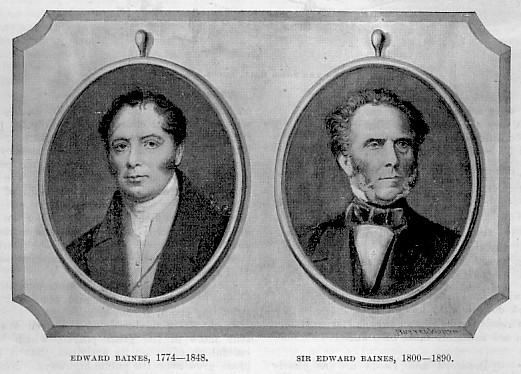
In due time Edward Baines became editor of the Leeds Mercury, a
paper which gave him an immense field whereon to advocate his truly
progressive principles of peace, civil and religious liberty, and
national economy.
Afterwards he sat in the House of Commons as member for Leeds,
taking his seat with the declaration: "My own judgment and
conscience shall be my guide, and the general happiness of the
people my aim." He
died in 1848, and may take his place in our memories as showing how
a man, without extraordinary advantages or shining gifts, may, by
sheer industry, energy, and worth, achieve a position of useful
influence which
far outweighs more sensational forms of success.
The cause of the poor factory children
|
"Weeping in the playtime of the others,
In the country of the free," |
found some of its prominent champions in Leeds, and among its
manufacturing class. There was Tom Sadler, both by culture and birth
something of an aristocrat, being descended from Sir Ralph Sadler,
one of Queen
Elizabeth's ministers who was deputed to carry to James of Scotland,
the news of his mother's execution. There was Robert Hall, a learned
lawyer, also enlisted in the children's cause. Above all, there was
Richard
Oastler, known as "the factory king" whose statue we had seen in
Bradford.
Those were "the days when no law prevented mill-owners from exacting
fourteen and fifteen hours of monotonous toil daily from tender
frames of young children whose ages were sometimes barely half as
many years."
In detailed fact, the Cotton Mills Act of 1819, fixed the working
age of children as nine and their number of working hours per week
at seventy-two! Even the Saturday half holiday was not exacted till
six years later. Yet
it must be remembered that a high authority asserts that between
1800 and 1850 the wealth of the country increased more rapidly than
in all the previous eighteen centuries since the coming of Julius
Caesar! It was a
wealth founded, alas on bitter pain and poverty.
Richard Oastler was born in Leeds in 1789, the son of a worthy
merchant who had often hospitably entertained John Wesley, and who
liked to tell how, on the great preacher's last visit, he had taken
little Dick in his
arms and had solemnly blessed him. The boy was educated at the
Moravian school at Fulneck. His first public work was to earnestly
support Wilberforce in his advocacy of negro emancipation. Some of
his political
views were so unpopular, that he was roughly handled by his
opponents, and on one occasion his coat was torn from top to bottom. With some grim sense of humour, he afterwards persisted in wearing
this garment in
public processions. By 1825, he was actively engaged in pleading the
wrongs of the factory children. His claim was indeed modest enough;
he asked only that their working day should be limited to ten hours! It is
said that groups of these suffering children sometimes attended his
meetings, listening with premature intelligence and adding the
pathos of their shrill voices to the applause.
In one of Oastler's speeches there occurs the following awful
sentence, a terrible indictment of fatherhood, when tempted by
indolence and cupidity—"I have seen full-grown athletic men whose
only labour was to carry
their little ones to the mill long before the sun was risen, and
bring them home long after it had set."
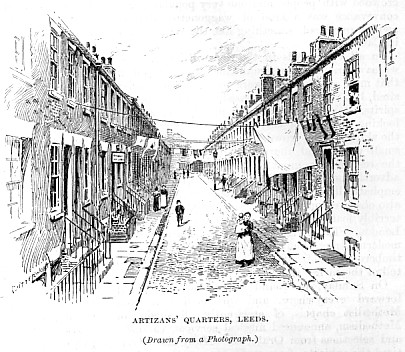
Oastler himself fell on evil days, for he was sent to prison for
three years for a debt which he declared had been contracted in the
service of his employer and for his interest. He received a great
deal of sympathy and
the sum was eventually paid by public subscription.
Despite the earnest and continued efforts of Lord Ashley (afterwards
Earl of Shaftesbury) and the good men we have named, there was no
really sound factory legislation till 1847, when a "ten hours'
Bill for women
and children" was passed, as it happened, while Lord Shaftesbury
was not in Parliament.
Since that period factory legislation has steadily advanced on the
wise and just lines of protecting the weak and undeveloped so that
they may have opportunity to become the strong and useful.
We reached Leeds on a Saturday, and of course found the places of
business closed—and the streets, especially the Briggate and Boar
Lane, so thronged with people that we could scarcely make our way. All the
shops in these thoroughfares were open, brilliantly lit and
abundantly stocked. Large crowds were waiting in front of the
theatres, whose advertisements seemed all of melodramatic pieces. Trams and buses were going
to and fro, crowded with people, and one very popular public
conveyance was a kind of waggonette with an awning overhead,
something like the vehicles used in Canada.
In all the crowds in the thoroughfares named, we saw absolutely no
drunkenness. It struck us that most of the people were young, rather
undersized, but well-fed, well-dressed, and in the best of spirits. We noticed,
however, many poor, starved looking children, of very tender years,
hanging on the skirts of the crowd and trying to sell flowers, small
wares, and above all newspapers recording the result of a great
football match. The
wall advertisements of all the local papers dwelt emphatically on
athletic and sporting news. We also observed many groups of elderly
men of that terribly loafing type one sees in the East End of
London. The Briggate
is, in the main, a very modern street, but here and there one finds
a timbered house-front or a quaint old shop which tell of the
earlier time.
On Sunday, we found harvest services going forward everywhere, and
we noted that even Methodist chapels, of apparently all shades of
Methodism, announced musical services, vocalists, and selections
from
Oratorios. Many also advertised the subjects of sermons.
From the point of view of the antiquarian, the most interesting
church in the town is St. John's in the Briggate, which was
consecrated in 1634. It is said to be an excellent specimen of a
"Laudian" church, and still retains its original fittings.
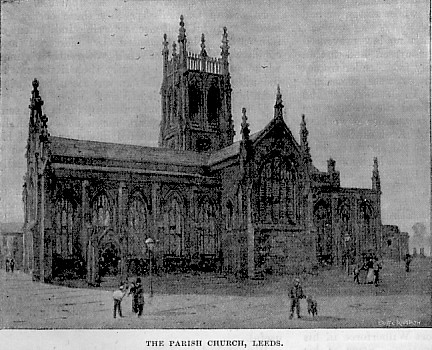
The parish church of St. Peter, in the Kirkgate, was rebuilt in
1840, under the auspices of the famous Dean Hook, who was then Vicar
of Leeds. Less than half-a-century old, its exterior is already
blackened by the atmosphere, and its interior is sombre with dark
oak and rich stained glass. The yard about it is paved with old
grave-stones, and is enclosed in a neat and pleasing precinct
comprising a Church House, a Church Club, a Church Ladies' Club, and
allied institutions.
Since the time of William the Conqueror there has always been a
church on this spot, and tradition has it that there was one even in
the time of the Saxon Heptarchy.
Returning from church to the centre of the town, down the highway
named "The Calls," and "Swine Gate," we passed through a poor
neighbourhood, whose corners and byways abounded with unkempt Sunday
morning loafers. We noticed that nearly every third or fourth house
had an open way through it, no wider than an ordinary house passage. These opened into little paved back courts, some bright and neat,
others utterly
squalid.
The most modern part of the town, where the great warehouses and
public buildings are, is built in a pretentious Renaissance style,
but local authorities frankly admit that "the universal coating of
grime spoils even the
finest buildings."
Ruskin tells us that "we cannot all have our gardens now nor our
pleasant fields to meditate in at eventide. Then the function of our
architecture is, as far as may be, to replace these to tell us about
Nature; to possess
us with memories of her quietness, to be solemn and full of
tenderness, like her; and rich in portraitures of her: full of
delicate imagery of the flowers we can no more gather, and of the
living creatures now far away from us in their own solitude."
In the light of such words, what are we to think of some of the
"architecture" in Leeds? The favourite decoration seems to be stone
half-figures chiselled as bent and writhing under the weight they
are made to support.
In one horrible instance, the pediments are formed of crouching
shrinking dogs, on whose bodies stand, as columns, human figures,
their own heads bowed forward, that the weight of the building may
seem to rest on
the nape of their necks! We hope that a day of better feeling and
taste has dawned, that these horrid fantasies of cruelty will pass
away, and that none like unto them will be added to their number.
Before we left Leeds, we knew it as well as it is possible, in a few
days' visit, to know a place of nearly four hundred thousand
inhabitants—the city fifth in population in the whole of England. It
is well equipped in many ways, with thirty-four churches, and more
than eighty chapels. Its municipal buildings include a reading-room,
a free library and a fine art gallery. It has other public
libraries. Its Mechanics' Institute offers many advantages—we were
struck by its attractive list of lecturers. It has a fair range of
philanthropic work of every kind.
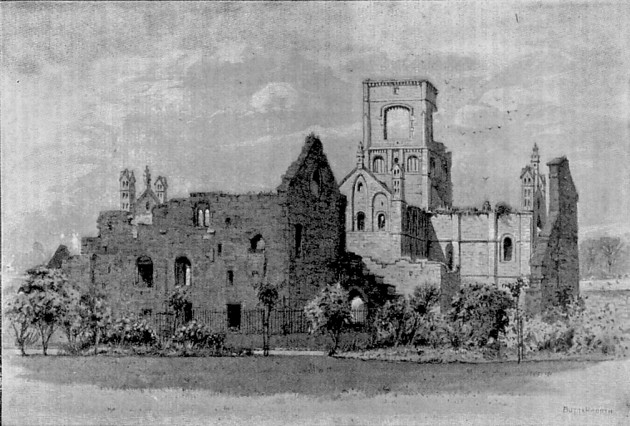
Kirkstall Abbey, Leeds, from the West.
One of the favourite "outings," of the Leeds people is to Kirkstall
Abbey. This lies to the west of the town, and is reached by a road,
the greater part of which is Dantesque in ugliness. Presently one
or two pleasant
terraces are reached, and the river comes to view. At last the town
ends quite abruptly, and one finds oneself in sight of the old
Cistercian abbey. It is in itself of great beauty and interest, but
its exterior has been
stripped so bare of ivy and tree, that at first sight, at a little
distance, it looks uncommonly like a wrecked factory. There has been
much local lamentation over the destruction of one particularly
noble old tree—a doom
accorded, it is said, lest gales should uproot it, to the possible
damage of the fragile ruins.
Down great highways, into which on either hand opened streets of
monotonous houses (many of them built back to back), we drove to
Roundhay Park, bought for public purposes by the Leeds Corporation
for £140,000. It is indeed a beautiful treasure for any city to possess,
consisting as it does of 800 richly-wooded and softly-undulating
acres, while being on the unsmoky side of Leeds, it gets little or
no damage from its grimy proprietor. But alas, it is nearly four
miles from the centre of the town, and half a mile's walk beyond the
tramway terminus. That means that it is further still from the
denizens of the crowded courts of Swine Gate. So what of the poor
old folks and the pale little children? Where have those to sit and
rest? And where have these to go and play?
Lockhart, the biographer of Sir Walter Scott, said that if the
history of any one family could be faithfully written, it might be
as generally interesting and as permanently useful as that of any
nation however great or
renowned. We have tried to prove that the same holds true of places,
even of those which are generally thought to be bare of romance and
suggestion. Good and unselfish lives are to be found everywhere,
glorifying
even factory chimneys, and softening furnace fires. The true
direction of wealth is in furnishing fit conditions for such lives. In the struggle with the difficulties and darknesses of modern
civilisation, it is helpful to
remember that the Kingdom of Heaven has been presented to our minds
by prophet and apostle, under the symbol of a city. By the vision of
brightness and beauty which their words bring, we begin to learn
what our
own duty is, if we dare to look for answer to our daily prayer. "Thy
kingdom come, on earth, as it is in heaven." I. FYVIE MAYO.
――――♦――――
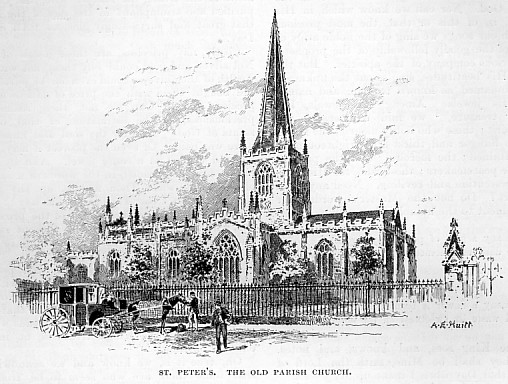
SHEFFIELD, YESTERDAY AND TODAY.
(From THE
SUNDAY AT HOME,
1898-99.)
WHEN we visited
Sheffield—passing through the romantic country which still lies
around the metropolis of steel, marred only by the low smoke clouds
which hide the blue heavens—a rich autumn sunshine had just strength
enough to strike out some Turneresque effects upon the thickened
atmosphere out of which the great chimney-stacks rose, like huge
masts from a befogged sea. But we could not resist asking
ourselves:
"What of the gloomy weather?—and the winter days?"
This is the penalty which Sheffield pays for the great
industry which has made her name known throughout the civilized
world—and the uncivilized too—Sheffield knives and other cutlery
having found their way everywhere. Of these goods, the
reputation was made neither to-day nor yesterday. For Chaucer,
in his "Reve's Tale," tells of the miller:
|
"There was no man for peril durst him touch,
A Sheffield whittle bare he in his hose," |
the "whittle being evidently stuck in his stocking, after the
fashion of Highlanders with their dirks, and needing no commendation
beyond the mere name of the place where it was made.
Chaucer died in 1400. But Sheffield had had plenty of
time to build up the character of its work before that period.
Nor is its history all comprised in the skill of clever artificers.
For its name (derived from the river "Sheaf" and from the cleared
land on which trees have been felled) emerges in the remotest
periods of our island story. It is believed that a Roman camp
once existed in what is now the very heart of the city—the
bleak-looking graveyard which surrounds the fine old parish church
of St. Peter. Certain it is that Sheffield was the capital of
the Saxon district of "Hallamshire"—the domain of the Saxon earl,
whose father, "Siward" avenged the Scotch king Duncan's death upon
the murderer Macbeth. His wife was that Judith the Norman
conqueror's niece, whose jealous family pride and ambition
eventually betrayed her spouse to death, and plunged her own closing
days in misery.
The history of Sheffield is entwined with that of a Norman
family who may have come in the train of the Lady Judith, and who,
settling near Sheffield, presently became great and powerful landed
proprietors furnishing the district with monastery, hospital, market
and mill. The marriage of the last daughter of this house of
De Lacy carried its possessions and influence into another family,
which numbered among its members a Crusader who fought by the side
of Richard I. at Acre, and a staunch supporter of Henry III. against
his insurgent barons. Sheffield suffered severely at this
time, being well-nigh destroyed and most of its inhabitants put to
the sword.
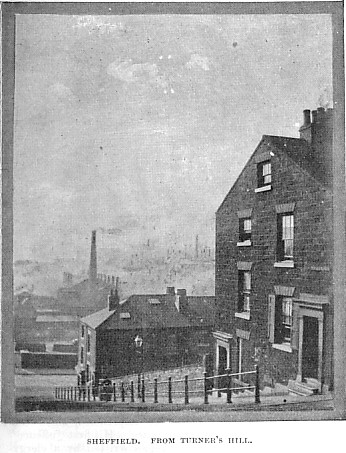 Again and again this line which seems to have discharged its lordly
duties, according to the best of feudal lights—changed its course
through ending in only daughters. It was one such who finally merged
the race in that of the great Earl of Shrewsbury, that hero of
scores of victories, who received check at the hands of the
mysterious maiden Joan of Arc, and eventually died, still fighting
against France, in his eightieth year.
Again and again this line which seems to have discharged its lordly
duties, according to the best of feudal lights—changed its course
through ending in only daughters. It was one such who finally merged
the race in that of the great Earl of Shrewsbury, that hero of
scores of victories, who received check at the hands of the
mysterious maiden Joan of Arc, and eventually died, still fighting
against France, in his eightieth year.
The Shrewsbury line continued its connection with Sheffield
till it once more ended with a daughter, who married into the family
of the Dukes of Norfolk. The fourth Earl of Shrewsbury built
that "Sheffield Manor," of which nothing remains but a fragment of
restored ruin. In that house, in the days of its glory—and the
earls of Shrewsbury lived sumptuously—Cardinal Wolsey spent a few of
his last sad days, pausing there in the course of the suffering
journey which ended with his death at Leicester.
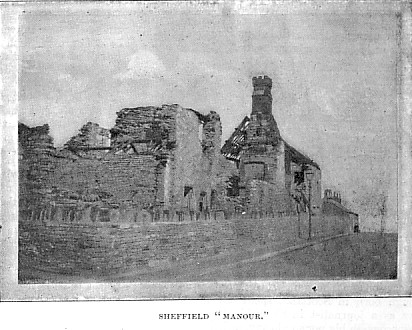
It seems to have been this fourth Earl of Shrewsbury of whom
Archbishop Parker tells a story which, though in this instance on
the side of the Englishman, yet conveys a lesson which Britons
themselves often require to consider both at home and abroad.
It seems that to the court of Hendry VIII. there came a pert
French ambassador, very fluent in speech, but with no better manners
than to criticise his hosts, dwelling on the "gluttony" of the
English race, and then dilating on the superiority of the French
language, then of almost universal use in the courtly world.
There sat at the table, Lord Shrewsbury, an agèd man, shaking with
palsy, contracted in many arduous adventures. The ambassador
singled him out for condescending notice, saying "that surely it was
a great lack to such a man's nobility that he did not speak the
French tongue." An English lord who was talking in French to
the discourteous guest, asked permission to translate his remarks to
the old earl, and then proceeded to do so in as pleasant a manner as
possible. But we must tell the rest of the story in the
Archbishop's own words:—
"When the earl heard it, where before his head, by the great
age was almost grovelling on the table, he roused himself up in such
wise that he appeared in length of body as much as he was thought
ever in all his life before. And knitting his brows, he laid
his hand on his dagger, and set his countenance in such sort, that
the French hardie ambassador turned colour wonderfully. 'Saith
the French fellow so?' saith he, 'marry, tell him if I knew I
had but one French word in all my body, I would take my dagger and
dig it out, before I rose from the table. And tell that varlet
that howsoever he hath been hunger-starved himself at home in
France, that if we should not eat our beasts and make victual of
them as fast as we do, they would so increase beyond measure, that
they would make victual of us, and eat us up.'"
Thus do thoughtless words stir up wrath, even as soft ones
turn it away, and who knows how often thoughtless words, in ever
increasing aggregate, may have solidified into those national and
racial hatreds and antipathies which finally explode in terrible
warfare, leaving behind the melancholy debris of ruined homes and
broken hearts?
Surely this grim Earl of Shrewsbury would not have been, as
was the sixth earl, unable to manage his own wife! To this
sixth earl was entrusted by Queen Elizabeth, the very ungracious
task of acting custodian to her captive "cousin," Mary of Scotland.
The Scottish queen spent the greater part of her fourteen years of
English imprisonment in this same "Manour of Sheffield." Some
authorities seem inclined to blame the royal prisoner for the
dispeace which broke out between her noble goaler and his spouse.
Mary had certainly wrought havoc wherever she moved, but in this
instance it must be remembered that the Countess of Shrewsbury had
been already three times a widow, and that bishops spoke of her as
"that sharpe and bitter shrewe." At any rate, she enlisted
Queen Elizabeth's sympathy with herself as against her lord, so that
a year after Mary of Scotland's execution, Elizabeth apportioned the
earl five hundred pounds a year, and put all the lands and revenues
in the power of his wife. The aggrieved husband wrote piteous
letters on the subject.
"Sith that her majestie hath sett dowen this harde sentence
against me, to my perpetual infamy and dishonour, to be ruled and
overawne by my wief, so bad and wicked a woman: yet her majestie
shall see that I obey her commandemente, though no curse or plage in
the erthe cold be more grievous to me."
The poor man rests at last among his ancestors in the
"Shrewsbury Chapel" of the old parish church. There is
something of humour in the fact that the inscription on his monument
was written by Foxe, the commemorator of martyrs.
His countess lived an active bustling life, superintending
her estates (she inherited from more than one of her husbands),
developing their resources, pulling political wires, and patronising
wits. She survived to the age of eighty-seven, leaving behind
immense fortunes, and the evil repute of being "a proud, furious,
selfish and unfeeling woman." What a pitiful failure for a
human life!
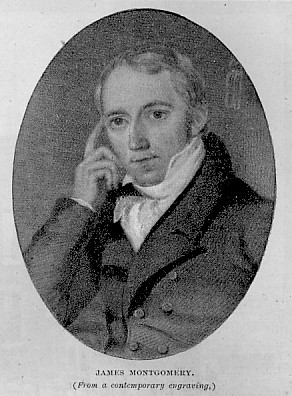 A very different life also has its memorial in this fine old
church of St. Peters. James Montgomery, one of the gentlest of
men and of poets, though born in Scotland, spent all his working
days as a journalist in Sheffield—then neither so prosperous, so big
nor so gloomy, as it is now. His life and story make us think
of a dove caught in a storm. For not all his gentleness and
conciliatory spirit—these being coupled with truth and justice
—could save him from being regarded as "a political offender" in
that agitated period of the great French Revolution. In 1794,
and again in 1795, he found himself imprisoned, fined and bound over
to keep the peace. His first "offence" was publishing some
verses written by a clergyman exulting over the demolition of the
Bastille: his second, his printed censure on the conduct of a
Sheffield magistrate, one Colonel Athorpe, in firing on a crowd.
How many have learned to love Montgomery's simple verses, "Sow in
the morn thy seed," or "Prayer is the soul's sincere desire," or
"For ever with the Lord," or the jubilant "Hail to the Lord's
Anointed," unknowing that this sweetness of devotion was distilled
from a, soul which had passed through experiences that might have
embittered and hardened some, but which only saddened and softened
him. It is pleasant to know that nearly fifty years after
these "contradictions of sinners," James Montgomery could say:— A very different life also has its memorial in this fine old
church of St. Peters. James Montgomery, one of the gentlest of
men and of poets, though born in Scotland, spent all his working
days as a journalist in Sheffield—then neither so prosperous, so big
nor so gloomy, as it is now. His life and story make us think
of a dove caught in a storm. For not all his gentleness and
conciliatory spirit—these being coupled with truth and justice
—could save him from being regarded as "a political offender" in
that agitated period of the great French Revolution. In 1794,
and again in 1795, he found himself imprisoned, fined and bound over
to keep the peace. His first "offence" was publishing some
verses written by a clergyman exulting over the demolition of the
Bastille: his second, his printed censure on the conduct of a
Sheffield magistrate, one Colonel Athorpe, in firing on a crowd.
How many have learned to love Montgomery's simple verses, "Sow in
the morn thy seed," or "Prayer is the soul's sincere desire," or
"For ever with the Lord," or the jubilant "Hail to the Lord's
Anointed," unknowing that this sweetness of devotion was distilled
from a, soul which had passed through experiences that might have
embittered and hardened some, but which only saddened and softened
him. It is pleasant to know that nearly fifty years after
these "contradictions of sinners," James Montgomery could say:—
"All the persons who were actively concerned in the
prosecutions against me in 1794 and '95 are dead, and, without
exception, they died in peace with me. I believe I am quite
correct in saying, that from each of them distinctly in the sequel,
I received tokens of goodwill, and from several of them substantial
proofs of kindness. . . . I mention the circumstance as an evidence
that, amidst all the violence of that distracted time, a better
spirit was not extinct, but finally prevailed, and by its healing
influence did indeed comfort those who had been conscientious
sufferers."
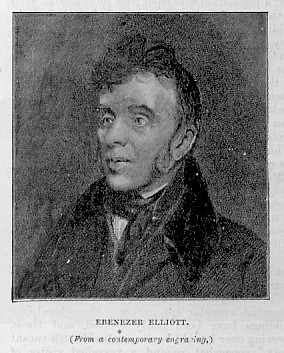 Sheffield can boast of another poet, but of a very different
calibre. Ebenezer Elliot—the "Corn-Law Rhymer," had "Border" blood
in his veins, but was born in Yorkshire, and drifted to Sheffield in
his maturer years. He had a hardy, rugged, yet not unhappy
childhood, but though he records that his schoolmaster was "one of
the best of living creatures,—a sad-looking, half-starved angel
without wings," the boy was set down as a hopeless dunce. He showed
no sense nor diligence where books were concerned, yet half a
century later he could dwell on the habits of birds which he had
watched during his walks to and from school. He was clearly one of
the many victims of educational systems which treat all minds as of
similar formation. He was quite glad when, partly as a punishment,
he was early sent to work in a foundry, for then he says he found
that he "could at least equal others in manual labour." Sheffield can boast of another poet, but of a very different
calibre. Ebenezer Elliot—the "Corn-Law Rhymer," had "Border" blood
in his veins, but was born in Yorkshire, and drifted to Sheffield in
his maturer years. He had a hardy, rugged, yet not unhappy
childhood, but though he records that his schoolmaster was "one of
the best of living creatures,—a sad-looking, half-starved angel
without wings," the boy was set down as a hopeless dunce. He showed
no sense nor diligence where books were concerned, yet half a
century later he could dwell on the habits of birds which he had
watched during his walks to and from school. He was clearly one of
the many victims of educational systems which treat all minds as of
similar formation. He was quite glad when, partly as a punishment,
he was early sent to work in a foundry, for then he says he found
that he "could at least equal others in manual labour."
He afterwards ran some risk of falling into the greater dangers of
ill-regulated young manhood. He was saved by a providence which
roused and directed the love of nature lying latent within him. A
widowed relative showed him "Sowerby's English Botany," and he took
to copying its plates, and better still, to gathering plants for
himself. His consequent wanderings leading him aside from the
alehouse and idle company, soon, says he, "made me acquainted with
the nightingales in Basinthorpe Spring, where, I am told, they still
sing sweetly, and with a beautiful green snake (he calls it "this
beautiful and harmless child of God"), which on the fine Sabbath
mornings, about ten o'clock, seemed to expect me at the top of
Primrose Lane. It became so familiar that it ceased to uncurl at my
approach."
These pursuits led him to the discovery that even books held some
things worth the learning. He set himself to make up, as well as
might be, for lost time. But long afterwards he owned that he knew
no rule of English grammar, though by study of the best masters he
could write English correctly.
In due time, he went to Sheffield and went into business for
himself, once unsuccessfully, the second time, when he was forty
years of age, with very considerable profit. Much of his gains,
however, were snatched from him when the panic and revulsion after
the operation of the Corn Laws made a very evil epoch for the United
Kingdom. At this time, he, having already attempted literature,
burst into a fiery popularity by the stormy verses which earned him
the name of the "Corn Law Rhymer."
It is hard to say whether his genius lost or gained by this special
application of it. What he lost in breadth, he possibly gained in
force. "Half Battles" were some of the words he wrote, and without
doubt they did their share in combating the evils they denounced,
and in calling for greater consideration of much that was wrong in
the lot of the labourer.
Ebenezer Elliott is essentially a Sheffield figure, for his trade of
ironmonger associates him with the peculiar industry of a city whose
"arms" have for supporters Thor and Vulcan. In Elliott's best-known
verses, beginning
|
"Idler, why lie down to die?
Better rub than rust," |
he actually draws a poetical image from his calling wherewith to
enforce a practical lesson.
In the beginnings of Sheffield—while its neighbourhood abounded with
deer, and venison was the common food of those who could afford
meat—the grinding wheels and small workshops were sprinkled about
amid much that still remained countrified. They were rough
buildings—seven or eight yards long, and four wide, seven feet high
to the spring of the roof—the walls plastered with clay the floor of
mud, hens roosting in the rafters.
In 1570, many artizans from the Netherlands, fleeing from the
Spanish tyranny there, settled in Sheffield. Still, in 1615,
Sheffield contained little more than two thousand two hundred
people, and of these more than a thousand were children, and only
ten families could afford to keep a cow. The Cutlers' Company,
though practically existent much earlier, was only formally
incorporated in 1624. Its early records shed an interesting light on
the labour questions and combinations of that period. Those who are
inclined to resent some of the modern trades'-union restrictions,
may be interested to hear that these old-fashioned "cutlers" made it
a punishable offence for work to be done at all for several weeks
during a certain period of the year. Eight or ten years of
apprenticeship were required. Each apprentice lived with his master,
who fed and clothed him, and gave him six weeks' holiday annually,
to attend "ye writing school." During this long apprenticeship,
there was no salary beyond a trifling yearly present.
The wives of the Sheffield masters were called "dames," and made all
social and domestic arrangements for the 'prentices, and, indeed,
they seem to have fulfilled many of the conditions of Solomon's wise
women. There has been a Sheffield saying that there have been no
good doings since so many fine mistresses came into fashion, and the
good old dames were supplanted. Their domestic value seems to have
earned a recognition it does not always receive, and they were not
ignored in other relations. Once, when the master cutler gave
festivity to his brethren, his wife followed it up with festivity
for the ladies. On one occasion, the "beadle" of the Company was a
woman. And the Company carefully guarded the interests of women, by
its concession known as "The Widow's Right," now we understand in
process of extinction.
The "Sheffield Grinders" have been a class by themselves. Elliott
drew one from the life:―
|
"Born to die young, he fears nor man or death;
Scorning the future, what he earns he spends.
Debauch and riot are his bosom friends.
. . . Full many a lordly freak, by night, by day,
Illustrates gloriously his lawless sway.
Behold his failings! He hath virtues, too:
He is no pauper, blackguard though he be;
Full well he knows what minds combined can do—
Full well maintains his birthright—he is free!" |
At one time, the conditions of grinding were such that the grinders
died at the age of twenty-nine. Despite the opposition of the men,
who feared lest any removal of the noxiousness of their work might
introduce more competition and cut down their wages, considerable
improvement has been made, and some of the grinders may now hope at
least to attain middle age. It seems that the "dry grinding"
required for table forks is the deadliest work. We should shudder to
have weapons from a battlefield laid down amid our household meal;
yet, in truth, our household implements seem well-nigh as fatal to
human life!
It struck one oddly, when in Sheffield, to notice how a population
who from time immemorial, even at the cost of their own length of
days, have been welding weapons of war to take the lives of folks
they have never seen, should be themselves of the kindliest and most
hospitable temper, so that it was a pleasure to be a stranger in the
place, and to throw oneself upon the courtesies so readily extended
to one. How well will it be for the world, when the Divine Spirit so
harmonises each man that he will be all of one piece, and will not
stretch out the long arm of gain, to do to those out of his sight
what his own hand would never do to the neighbour at his side.
Sheffield has not been always the wealthy city that it is to-day. About, two hundred years ago, master cutlers, when they had saved
£500, retired from business and took to farming. In 1794, the
common wage of a journeyman cutler was two shillings a day, a few
superior workmen earning three. But, in those days, meat was only
threepence or fourpence per pound, and other necessary commodities
were cheap in proportion.
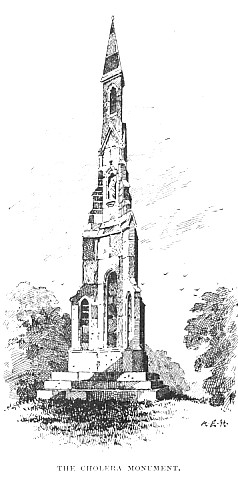 Sheffield stands on so hilly a site that it has a somewhat irregular
appearance. Many handsome buildings have been lately erected, and
these, towering over low old houses, or beside still vacant "lots,"
somewhat remind a travelled visitor of certain colonial cities such
as Ottawa. Some of the lower parts of the town are very squalid and
gloomy. The old parish church, which dates from 1154, but was
thoroughly restored and enlarged in 1880, would be very handsome
could its architecture be appreciated under the blackness with which
the local atmosphere has clothed it.
Sheffield stands on so hilly a site that it has a somewhat irregular
appearance. Many handsome buildings have been lately erected, and
these, towering over low old houses, or beside still vacant "lots,"
somewhat remind a travelled visitor of certain colonial cities such
as Ottawa. Some of the lower parts of the town are very squalid and
gloomy. The old parish church, which dates from 1154, but was
thoroughly restored and enlarged in 1880, would be very handsome
could its architecture be appreciated under the blackness with which
the local atmosphere has clothed it.
This church has two quaint stories about it. One, that a girl,
falling asleep during service, awoke to find herself deserted and
locked in. Her imprisonment might have lasted for days, had she not
hit on the clever device of arresting the swinging pendulum of the
clock, stopping it, and thus calling attention to the building and
its prisoner.
The other story has in it an element of mystery and pathos. It
concerns a blank and broken tombstone, which may be noticed near the
vestry door, and has long been a favourite leaping place for the
Sheffield boys. It appears that long, long ago, an unknown visitor
arrived at an inn in Sheffield High Street. He went to his bedroom. In this chamber there was an unused door-window opening straight
upon the yard. It had been accidentally left unbolted. The stranger
opened it, and, believing he was stepping into a passage, fell on
the stones below and was killed on the spot. In those days, when
communication over the country was slow and difficult, his identity
was never discovered, and doubtless there were those who watched for
him for years—and may have even felt bitter doubts of him when he
"came not back." As he had a considerable sum with him, he was
handsomely buried; but it is believed that his tombstone got cracked
in a thievish effort to move it, owing in to a report that some of
his gold had been interred with his corpse.
Most of the other numerous churches and places of worship in
Sheffield have been built within the last fifty years. The preaching
of John Wesley and his earlier followers, gave an immense impetus to
the spiritual life of Sheffield. Several of the latter "testified"
there, not only with their lips, but by the meekness and courage
with which they endured persecution. One of them had a bucket of
bullock's blood thrown over him as he walked through the street in
his best clothes. Wesley himself is known to have paid thirty-two
distinct visits to Sheffield, though others may not have been
recorded. Of Norfolk Street Chapel it is recorded that "John Wesley
preached for the first time in the Newhouse on 30th June, 1780." It
is believed that his latest surviving hearer died as recently as
1873.
Sheffield, despite its smoke and squalor is in many ways a specially
well-equipped city. It has six parks, one of them given by Mark
Firth, also the founder of Firth College, designed to provide
university training for many who could not otherwise enjoy it. In
another, Weston Park, is the noble picture gallery presented and
equipped by the Mappins, containing many masterpieces among its
permanent treasures, and offering houseroom to a succession of loan
collections of high type. Incorporated with this gallery is a museum
of old pottery, and local natural history, industries, and
antiquities—the collection being large enough to be varied and
interesting, while not so large as to be overwhelming. On the
afternoon of our visit, we found many visitors, nearly all of the
working class.
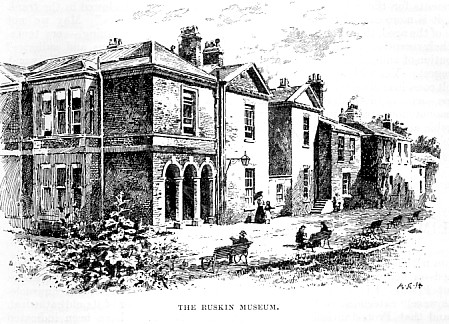
A two miles' journey through small streets with wooden shuttered
parlour windows, or low rows of humble shops, brings us to the
pleasantly-wooded and undulated Meersbrook Park, with the quaint
buildings which house the "Ruskin Museum" which the St. George's
Guild has loaned to Sheffield for twenty years from 1890. This
museum is intended as a type of the collections which Mr. Ruskin
desires to see established throughout the country for studious
culture of all that is noble in art and beautiful in nature. He
considers that such local educational museums are necessary to train
the people to appreciate the unique treasures of any worthy national
collection. As it is also his wise opinion that "a collection should
never be increased to its own confusion," only a limited number of
examples—especially of art objects—are on view at a time. The
collection includes rare minerals, a collection of exquisite
drawings in natural history, casts taken by Mr. Ruskin in Venice and
Rouen, architectural studies, rare editions of classical literature,
engravings after Turner, magnificent illuminated ancient
manuscripts, and fine Greek and English coins.
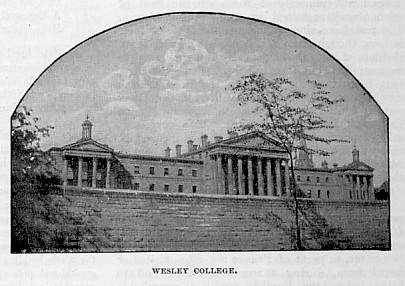
Sheffield has many excellent educational institutions, its Grammar
School dating from 1604. Its Band of Hope Union comprises 160
societies, and its Sunday School Union has on its roll 32,000
scholars. It has learned societies of every form, and a free library
which in its two departments contains nearly 50,000 books. It has
institutions for the relief of every form of physical suffering, and
with all these arrangements for the needs of the future and the
present, it is more careful than are many cities of the claims of
the agèd, there being several establishments for their reception and
other endowments for the distribution of annuities.
One left Sheffield with regret. Yet with all its industry and
wealth, one felt conscious of deterioration and loss when one
came—as one often did—in the midst of some mean monotonous street,
upon an old thatched or tiled gable and a few gnarled trees bearing
mute witness to the vanished times of the old world masters, and of
rural life. One cannot bring oneself to accept to-day's smoke and
ugliness as finalities. They must be but part of a process evolving
some beauty and order not yet apparent, unless indeed foreshadowed
in the frank warm-heartedness of the "folks." May we not see this new
order already beginning—very tentatively—in the parks and museums
and galleries? Dare we hope that we have at last seen the worst of
our factory and furnace towns, and that henceforth, the science and
invention and enterprise whose progress has made them what they now
are, will turn attention to making them all they should be?
ISABELLA FYVIE MAYO.
――――♦――――
THE STORIES OF FAMOUS SONGS.
(The GIRL'S OWN
PAPER, June, 1888.)
T has been aptly said that "the making
of the song of a people is a happy accident. . . . It must be the
result of fiery feeling long confined, and suddenly finding vent in
burning words or moving strains. Great national lyric is the
result of the conjunction of the hour and the man."
There is no better illustration of this than the popular
American war song, "John Brown's Body." There is literally
nobody who claims its authorship. Words and tune "grew"
together in the early days of that great war between the Northern
and the Southern States which settled the question of American
slavery for ever.
Yet there is no song which has a better story to tell.
And as there is seldom any historical period so misty to our minds
as that which immediately precedes the date of our own personal
histories, we are sure that there are many girls who will thank us
for a glimpse of the heroism and romance which wrought out a great
national drama in the days when their fathers and mothers were the
young folks of the world.
We are not ambitious enough to attempt any history of the
rise and development of slavery in the United States of America.
We shall only attempt to set forth, as simply as we can, a few facts
necessary to explain its existence and the varying influences that
surrounded it, and that finally brought about its extinction.
Let it suffice to say that slavery—that supreme crime against
humanity—originated in the States when they were a British colony.
Therefore, the worst indictment we have any right to bring against
them in this matter is, that they did not all come to a full
realisation of the heinousness of this evil quite so soon as did the
mother country.
Now, at the very outset of this paper we must caution our
readers against an error which we would not imagine could be fallen
into by educated people, had we not proved it to be so. They
must realise at once that the Northern and Southern States are alike
in North America, different parts of the Republic of the United
States. These have nothing whatever to do with the continent
of South America, with all its varying empires and republics, mostly
Spanish in origin and development. We should have thought such
a caution quite unnecessary, had we not heard a friend from Buenos
Ayres being constantly asked "Whether the party feeling between the
Northern and Southern States had now entirely passed away?"—the
questioners being presumably educated people and filling respectable
and indeed honourable positions in British society.
Having explained this much, we may go on to say that from the
earliest days of the British colonisation of North America a vital
difference arose between those States called the Northern and those
afterwards grouped as the Southern.
The Northern States were founded by "The Pilgrim Fathers,"
who were themselves exiles from Britain for the sake of civil and
religious freedom. In the communities under their influence
certain religious and political theories were made of the first
importance from the very beginning. They started on the path
of moral progress, though the struggle for existence and the greed
for material wealth soon entered in, to warp the nobler aims.
The Southern States, on the other hand, were colonised by
aristocratic English adventurers, often of high character and
courtly manners, but whose first aim was the profit and comfort of
their immediate followers, without any special sense of
responsibility towards the community at large. Thus in these
Southern States a wide gulf soon yawned between the upper and lower
classes. "Below the great landholders came a population
largely tainted with pauperism and crime." Further, the
development of the natural resources of these Southern States
required masses of specially cheap labour.
How was this to be supplied?
At first, the forced labour was of white people, "criminals,
beggars and vagrants" being transported there from the mother
country. Orphan or friendless children became the victims of
family cruelty or mercenary greed. But still the supply was
insufficient for the demand.
Then these our colonies in the Southern States resolved to
follow the example of our colonies in the West Indies, and to
encourage the importation of negroes. The first shipload was
landed in 1620, at Jamestown. In 1662, the Royal African
company was incorporated, with the English King Charles II. and his
brother as its chief directors, its main business to be the
exportation of negroes from Africa to slavery in the plantations.
The black slave soon supplanted not only the white bondservant, but
the white labourer of every kind. The Southern States became
the home of a white aristocracy, a black slavery, and a desperate
ruffiandom.
In 1772, a slave named Somerset, brought to England by his
master, was, on account of ill-health, turned adrift. When,
through the charity of Mr. Granville Sharp, he was restored to
health, his master again claimed him. A suit resulted, which,
mainly owing to the energy and determination of Mr. Sharp, ended in
a decision that slavery could not exist in Great Britain.
Owing to the revolt against sundry British impositions, the
United States declared their independence of Britain in 1776.
They were recognised internationally as a distinct Government in
1783; and in 1787, the American Congress passed an unalterable
article forbidding slavery in that part of their territory
north-west of the Ohio. This put the Northern States on the
same footing that Great Britain had already attained, while slavery
still persisted in the Southern States of the Republic as it did in
those West Indian colonies which remained in British possession.
Slavery finally terminated in all British possessions between
the years 1833 and 1838. Its extinction cost the British
nation £20,000,000.
It still lingered in the Southern States of America, and in
its most frightful form. In the slavery of the antique world
the masters had been content with the possession of their human
chattels, often employed as tutors and guardians, and frequently
attaining high rank in philosophy and learning. In Oriental
slavery there had been hope. The slave to-day was often Grand
Vizier to-morrow. But in America they sought to deprive the
human chattel of mind, soul, and affection. To educate him was
penal. He could have no family ties. The Courts of
Justice were closed against him, and the curse of slavery pursued
the least drop of African blood, however diluted it might be with
that of the ruling race.
The advocates of slavery had two or three arguments on which
they laid great stress. One was that the slave in the Southern
States was generally well-treated and content, in evidence of which
they told stories of domestic attachments, and brought forward his
merry plantation songs. Of course, it would be going too far
to say that the large majority of slaves were treated with personal
violence and cruelty. They were only entirely at the mercy of
their master pro tem., and away from the kindest owner they
might be sold any day, either at his own will, or at the will of any
creditors or trustees into whose hands he chanced to fall.
Among the women, wifehood and motherhood were only other names for
shame and agony. It was the cruellest wrong of all if they
were kept in such a low condition as to be unable to realise all the
bitterness of their lot. But that many of them did escape this
crowning ignominy is proved by the wildly pathetic hymns in which
they cried out to God for His help and support.
Another Southern argument was, that the Northerner, though
not a slave-holder, held the negro in such bitter contempt and
abhorrence, that his free life in the Northern States was lacking in
many of the alleviations which he often found in his Southern
slavery. There is no denying this indictment. But
neither do two wrongs added together amount to one right! In
excuse of the Northerner, it can be pleaded that this savage nation
had been poured upon his country, not for his benefit, but for the
interests of his Southern brother; that the negro was a portentous
appearance in those States where white labour abounded, and
competition was already fierce enough. Furthermore, the negro
stood to the Northerner as the outward and visible sign of the
Northerner's own subjection. For Southern voices were
predominant in the councils of the nation, and it was mainly
through, and for slavery, that such predominance was jealously
maintained.
On the side of the North we may justly urge, that whatever
might be popular prejudices, it was in her States, and under
influences that had made her what she was, that all true and loving
help for the slave originated; the voices of the North were ever on
the side of freedom. We all know Longfellow's "Poems on
Slavery." Perhaps not quite so many of us are equally familiar
with those of John Greenleaf Whittier, the American Quaker poet,
who, like so many of his sect, threw himself heart and soul into the
cause of the slave. It is characteristic of the man, and his
deathless faith and hope, that he called his outpourings "The Voices
of Freedom." One of the best known of these is "The
Christian Slave," founded on an incident at a slave auction in New
Orleans, where the auctioneer recommended the woman under the hammer
as "a good Christian." The indignant poet breaks forth:
|
"My God! can such things be?
Hast Thou not said that whatso'er is done
Unto Thy weakest and Thy humblest one,
Is even done to Thee?
In that sad victim, then,
Child of Thy pitying love, I see Thee stand
Once more the jest-word of a mocking hand,
Bound, sold, and scourged again!" |
We should quote from Whittier more largely, for his works
(save his translation front the German of "The Angel of Patience ")
were but little known in Britain a few years ago, but we refrain,
since they are now widely circulated and easily procurable.
The poet Lowell, and the philosophers Emerson and Thoreau,
were also active and consistent in their advocacy of the slave.
But the subject of American slavery was first brought before the
whole world in a strongly picturesque form in 1852, by the
publication of "Uncle Tom's Cabin," written by Mrs. Harriet Beecher
Stowe. The enthusiasm of sympathy which it created was
immense. One result was an appeal from the women of England to
the women of America, which was headed by the mother of the present
Duke of Sutherland, and obtained nearly six hundred thousand
signatures. From that time the subject was never left at rest.
Special cases of fugitives were constantly before the Northern
courts. The "border" States were kept unsettled by perpetual
"risings" and skirmishings between the slave party" and the
abolitionists. One such struggle in Kansas, and of
considerable importance, brought to the front that indomitable hero
whose name is now embalmed in the great rough Yankee war-song.
That name is
JOHN BROWN OF OSSAWATTOMIE.
It need hardly be said that he belonged, by descent, to the
stern Puritan stock which had colonised the Northern States.
He was born in Connecticut, but he was only five years old when his
family moved to Ohio, then a wilderness filled with wild beasts and
Indians. There he lived the hardy adventurous life of a
healthy lad in a new country. By the time he was twelve years
old he was often sent off alone more than a hundred miles with
companies of cattle.
It was during a brief war between England and the United
States (which broke out in 1812) that he was brought under
influences which decided the current of his life. His father
sold cattle to the American troops, and in his capacity as assistant
he saw a good deal of military life, "more, perhaps, than if he had
been a soldier, for he was often present at the councils of the
officers." This was to prove an important element in his
training for the future, but the immediate result was to disgust him
with military life, so that he refused to train, and was fined in
consequence. "He then resolved that he would have nothing to
do with any war, unless it were a war for liberty." It was at
this same period that there occurred the incident which we prefer to
tell in his own words, as we find them in an autobiographical
fragment written for the benefit of a young friend:—
"John was staying for a short time with a very
gentlemanly landlord, once a United States Marshal, who held a slave
boy near John's own age, very active, intelligent and good feeling,
and to whom was under considerable obligation for numerous little
acts of kindness. The master made a great pet of John, brought
him to table with his first company and friends, called their
attention to every little smart thing he said or did, and to the
fact of his being more than a hundred miles from home with a company
of cattle alone; while the negro boy, who was fully if not more than
his equal, was badly clothed, poorly fed and lodged in cold weather,
and beaten before his eyes with iron shovels or anything that first
came to hand. This brought John to reflect on the wretched,
hopeless condition of fatherless and motherless slave children, and,
in the end, made him a most determined abolitionist, and led him to
declare or swear eternal war with slavery," so that at last he
believed he "held a commission direct from God to act against it."
His education was purely that of practical life. He
learned nothing of grammar, nor of arithmetic beyond the first four
rules. He had never danced; he had never used a pack of cards.
But he was fond of reading, and he felt that "by reading the lives
of great, wise and good men, their sayings and writings, he grew to
a dislike of vain and frivolous conversation and persons." He
was very familiar with the Bible, and had a most unusual memory for
its contents. In business he was diligent and shrewd, but with
a keen sense of honour, so that he refused to sell his leather while
it retained a particle of moisture, lest his customers should be
cheated in value or weight. In the course of his business he
visited England. But though he was ever increasing in social
weight and importance, such a man was not likely to make money.
Indeed, from the year 1839 he cherished the hope of some organised
attempt at the delivery of the slaves, and "from that time he
engaged in no commercial speculation which he could not honourably
and without serious loss to his family wind up on short notice."
As we have said already, he became prominent in the border
warfare of which the State of Kansas was the arena in 1855-7.
Neither the property nor the life of anybody suspected of being an
abolitionist was safe, and brutal outrage on the one side
occasionally provoked stern reprisals from the other. In John
Brown's camp the strictest order and discipline prevailed, "no man
of immoral character was allowed to stay, except as a prisoner of
war." The great leader said: "He did not love warfare but
peace—only acting in obedience to the will of God, and fighting
God's battles for His children's sake," and therefore "he he would
rather have the small-pox, yellow fever, and cholera together in his
camp, than a man without principles." A favourite remark was,
"One man in the right, and ready to die, will chase a thousand."
The fortunes of this warfare constantly varied, but with an
ever-growing force of public feeling on the abolitionist side.
It is impossible for us in this paper to follow in detail the
events which led to John Brown's raid on the Arsenal of Harper's
Ferry, which was to be the starting-point for a general rising of
the negroes, and which he hoped, if successful, would banish slavery
from the Southern States, while, if unsuccessful, he trusted at the
worst to be able to force his way with his followers to British
ground in Canada, and thus, at the least, to secure freedom for a
large multitude.
Many of his most faithful adherents considered the scheme
hopeless, but seeing that he was not to be turned from it, "could
not give him up to die alone."
Before the raid, John Brown himself wrote a letter which
states his own motive and expectation, and which, viewed in the
light of subsequent events, seems like a prophecy.
"I have only had this one
opportunity in a life of nearly sixty years. . . God has honoured
but comparatively a very small part of mankind with any possible
chance for such mighty and soul-satisfying rewards. I
expect nothing but to endure hardness, but I expect to effect a
mighty conquest, even though it be like the last victory of Samson."
The attempt was made and ended in—failure! It is said
that the immediate cause of this was Brown's consideration for the
interests of some prisoners who fell into his hands, and for whose
sake he delayed in the carrying out of his original plan. He
himself fell wounded, and was made prisoner, and of his little
following of twenty-two, ten were killed in the conflict, five
escaped, and seven were captured, tried and hanged.
History contains nothing grander than the account of John
Brown as he lay in his prison awaiting trial and death by the law of
his country. He had thoroughly counted the cost of his attempt
beforehand, for even years earlier he had actually written—
"The trial for life of one bold,
and to some extent successful, man, for defending his rights in good
earnest, would arouse more sympathy throughout the nation than the
accumulated wrongs and sufferings of more than three millions of our
submissive coloured population."
His most adverse critics say "that the authorities hurried
through his trial for treason, conspiracy, and murder with an
unseemly precipitancy, almost calculated to make him seem the
accuser, and the commonwealth the trembling culprit."
Meanwhile the agèd and suffering prisoner was calm and
content. The women whom he had left at home—his wife bereaved
of several of her sons, and his daughters widowed of their
husbands—did not grudge their own share in the great sacrifice.
They had thrown no obstacles in its way. They had learned from
him to make the cause of the oppressed their own, and had been
reared in the atmosphere of the simple couplet which he had taught
them all, down to the youngest, a wee maiden of five—
"Count that day lost whose low descending
sun
Views from thy hand no worthy action done." |
Wonderful were the letters which they received from the
husband and father in his condemned cell. He could cheer them
by writing—
"I cannot remember a night so dark
as to have hindered the coming day, nor a storm so furious or
dreadful as to prevent the return of warm sunshine and a cloudless
sky."
He was ready with advice for the future of his young
unmarried daughters, reminding his wife that he had "always
expressed a decided preference for a plain, but perfectly practical,
education, for both sons and daughters," meaning thereby "enough of
the learning of the schools to enable them to transact the common
business of life, together with that thorough training in good
business habits which best prepares both men and women to be useful
though poor, and to meet the stern realities of life with a good
grace. You well know," he writes, "that I always claimed that
the music of the broom, wash-tub, needle, spindle, loom, axe,
scythe, hoe, flail, &c., should first be learned at all events, and
that of the piano, &c., afterwards. I put them in that order
as most conducive to health of body and mind, and for obvious
reasons, that, after a life of some experience and much observation,
I have found ten women as well as men who have made their mark in
life right, whose early training was of that plain, practical kind,
to one who had a more popular and fashionable early training."
He strove to guard his family against any wrong deductions
from the interest felt by most Northerners in their present tragic
position.
"Let me tell you that the sympathy
that is now aroused in your behalf may not always follow you.
There is but little more of the romantic about helping poor widows
and their children than there is about trying to relieve poor
'niggers.'"
And so little did he regret the sacrifice of his own life for
the cause of freedom, that in his very last letter home he solemnly
enjoined on his children, "to abhor with undying hatred, that sum of
all villanies—slavery."
He made a friend of his very gaoler, and enjoyed his present
opportunity of impressing his own views on the minds of many of the
slavery party who visited him in prison, where he lay in the
blood-stained clothes in which he had fought. He would take no
credit for his own cheerfulness and fortitude, only saying with a
smile, "Some can bear more than others, and not suffer so much. . .
. it is only a constitutional difference, and I have been trained to
hardships. . . . I have always been more afraid of being taken into
an evening party of ladies and gentlemen than of meeting a company
of men with guns."
Nor can there be anything more touching than the simple
account of the last scene of all, when, on the 2nd of December,
1859, John Brown was led out to die. As he left the gaol, he
said, "I can endure almost anything but parting from friends; that
is very hard." He had refused the ministrations of clergymen
since none could reach him but those who were believers in the
institution of slavery, and who, therefore, as he said, stood more
in need of his prayers than he of theirs. He had remarked that
if he had a choice, he would prefer to be followed to the gallows by
a few poor negro children than by any such chaplain. Just as
he passed the prison door, a negro woman held up her little child,
and then, as Whittier sings—
|
"The bold, blue eye grew tender, and the
old harsh face grew mild,
As he stooped between the jeering ranks and kissed the negro's child." |
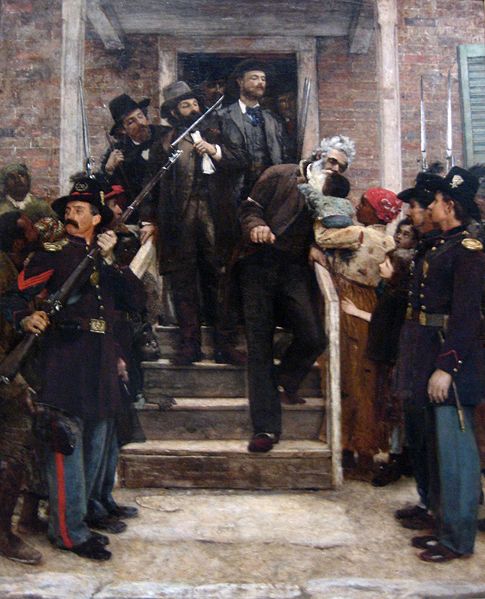
'The Last Moments of John Brown', by Thomas Hovenden.
Source Wikipedia.
The procession moved on. As John Brown came upon an
eminence near the gallows, he was observed to take his last look
over the beautiful landscape, following with his eye the windings of
the Blue Ridge Mountains in the distance.
"This is a beautiful country," he remarked.
"You are a game man, Captain Brown," said the undertaker who
rode by his side.
"Yes," he answered, "I was so trained up it was one of the
lessons of my mother. But," he reiterated, "it is hard to part
from friends, though newly made."
"You are more cheerful than I am," said his companion.
"Yes," he replied, "I ought to be."
They kept the old man standing blindfold on the scaffold
while the troops in attendance went through sundry military
manoeuvres. What did it matter? It was but the last
cruelty which slavery could inflict upon him who (little as it
seemed then) had given it its deathblow.
Then all was over.
The hero's body was given to his family, and was taken back
to the neighbourhood of his home within sight of the Adirondacks,
where by his own desire his name was simply placed upon an old
tombstone which already bore that of his grandfather.
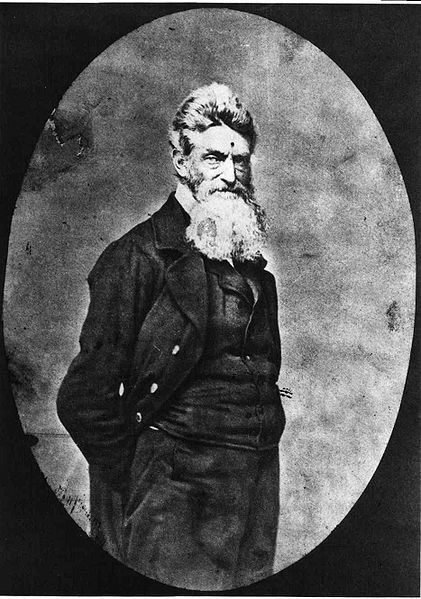
John Brown in 1859 by Black and Batchelder:
Library of Congress.
Source Wikipedia.
From his portraits—not idealisations of loving reverence, but
engravings from homely photos—John Brown looks at us with a grave
face, which yet seems quivering with tender humour. It is said
that in a bust of him a strong likeness comes out to Michael
Angelo's ideal of "Moses," the great leader of another enslaved
people.
Among John Brown's last words to his wife had been these
"Those that are dead to this world are angels in
another,"
and very shortly afterwards Thoreau, the philosopher, wrote—
"Of all the men who were said to
be my contemporaries, it seemed to me that John Brown was the only
one who had not died. . . I never hear of any particularly brave and
earnest man, but my first thought is of John Brown, and what
relation he may be to him. I meet him at every turn. He
is more alive than he ever was. He has earned immortality.
He is not confined now to North Elba or Kansas. He is no
longer working in secret. He works in public in the clearest
light that shines in the land."
And though on the dreary night of his execution there was
wailed about the streets of Boston a dismal lament—
|
"Tell John Andrew,
Tell John Andrew,
Tell John Andrew,
John Brown's dead"— |
yet it was singular how soon the realisation of his persistent
vitality entered into the popular idea. The Southerners soon
discovered the truth of a poet's prophecy—
|
"Old Brown,
Osawatomie Brown,
May trouble you more than ever when you've
nailed his coffin down!" |
Never again were the Southern States permitted to dominate
the Union. Early in the following year, Abraham Lincoln, a
Northerner by descent, by character, and by principle, was returned
to the presidential chair, whereupon the Southern States, unwilling
to obey where they had ruled so long, raised the standard of
rebellion, and there broke forth the long fierce war between the
Northern and Southern States, whose most striking feature was the
total and entirely unconditional abolition of slavery in 1862,
barely three years after John Brown's execution!
Nobody seems able to tell exactly how
|
"Tell John Andrew
John Brown's dead," |
developed into the rudely grand "marching song":
|
"John Brown's body lies a-mouldering in the grave,
John Brown's body lies a-mouldering in the grave,
John Brown's body lies a-mouldering in the grave;
But his soul is marching on.
Glory, glory Hallelujah; glory, glory, Hallelujah, &c.
He captured Harper's Ferry with his nineteen men so true,
And he frightened old Virginia till she trembled through and through;
They hung him for a traitor—themselves the traitor crew!
But his soul is marching on.
Glory, glory, &c.
John Brown died that the slave might be free,
John Brown died that the slave might be free,
John Brown died that the slave might be free;
But his soul is marching on.
Glory, glory, &c.
"Now has come the glorious jubilee,
Now has come the glorious jubilee,
Now has come the glorious jubilee,
When all mankind are free.
Glory, glory, &c." |
One Northern military man asserts that the song was put
together by a quartet of men in the second battalion quartered at
Boston harbour, in April, 1861. These four men, it appears,
re-enlisted in the Twelfth Massachusetts Volunteers, commanded by a
Colonel Webster. It is an undoubted fact that Webster's
regiment first adopted it as a marching song, singing it down
Broadway, New York, as they went out to the front is the summer of
the same year. Before a year later, the tune had been taken up
by the nation at large, and hundreds of thousands of soldiers were
marching forward with the name of John Brown on their lips.
Let the simple song and its hero's brave story help to keep
up our own faith and hope even when the days are darkest and triumph
seems on the side of wrong. For there are still struggles to
be fought out. We must not allow ourselves to think that all
the giants of evil in this world are already slain for us, and that
we have nothing to do but to enter into the fruits of others'
victory. Evil is hydra-headed. Slavery was but one
manifestation of human selfishness, and while that root remains,
other manifestations as evil will spring up only the more deadly if
they are less defined. Each heroism of the past is but one
more stone laid in the foundation of that Kingdom of God for whose
coming we all pray, but for which we must also live and labour.
And let us not forget to consider the homely women who stand in the
background of this national tragedy—the good mother who reared her
son hardily, the good wife and daughters ready to endure hardship
and accept sorrow, but not to hinder the hero in his work. It
is not for us to reckon whether our tasks in life be great or small,
whether they shall succeed or fail. We need answer but one
question: "Ought they to be done?" If the answer is "Yes,"
then let us do them with our best powers. The rest is God's
business, not ours.
ISABELLA FYVIE MAYO
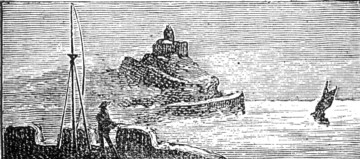
Ed.—it might interest the reader to
to know that slavery was practiced in Scotland until the end of the
18th century. Thus Samuel Smiles on the subject:
". . . . the magistrates of some of the larger towns
did not hesitate to kidnap and sell into slavery lads and men found
lurking in the streets, which they continued to do down to a
comparatively recent period. This, however, was not so
surprising as that at the time of which we are speaking, and,
indeed, until the end of last century, there was a veritable slave
class in Scotland—the class of colliers and salters—who were bought
and sold with the estates to which they belonged, as forming part of
the stock. When they ran away, they were advertised for, as
negroes were in the American States until within the last few years.
It is curious, in turning over an old volume of the 'Scots
Magazine,' to find a General Assembly's petition to Parliament for
the abolition of slavery in America almost alongside the report of a
trial of some colliers who had absconded from a mine near Stirling
to which they belonged. But the degraded condition of the home
slaves then excited comparatively little interest. Indeed, it
was not until the very last year of the last century that prædial
slavery was abolished in Scotland—only three short reigns ago,
almost within the memory of men still living."
Samuel
Smiles . . . . Roads
in Scotland Last Century.
――――♦――――
"SOMETHING ACCOMPLISHED."
(From THE SUNDAY AT HOME, annual edition,
1898-99)
SOME sides of
life seem to receive so much more attention than others. How
much is written of the loves of young hearts, so often fickle,
wilful, and unworthy, how much compared with what is told us of the
strong affections of maturer years, which trial has purified from
dross, and which time and experience have welded into faithful and
selfless devotion? So, too, we hear much more of the beauty
and delight of "youth in its aspiration" than of the dignity and joy
of age in its accomplishment.
There are reasons for this. The orchard blossoms make a
braver show in spring than do its fruits in autumn. For there
are so many blossoms which never arrive at fruitage, while sometimes
the fruit can scarcely be seen unless sought for, or revealed by the
shrinking of the leaves under the breath of early frosts. So
with aspiration and accomplishment. It remains true, as
Schiller sang:
|
"Thousand-masted, mighty, float
Out to sea, Youth's navy goes:
Silent, in his one-oared boat
Age into the harbour rows." |
Yet after all it is only the "accomplishment" of maturity, be
that large or small, which gives any value to the aspiration of
youth. The greater interest gained by the latter is perhaps
mainly due to the element of uncertainty in this very matter of
fulfilment.
It should be the crowning blessing of matured or fading life
that it sees behind it that "something accomplished, something done,
which earns a night's repose." This is in the order of the
will of God. He ordains alike seed-time and harvest, and the
last is the time of ingathering and festival. His will has
been set aside somewhere if life's autumn brings us "nothing but
leaves."
We are all conscious that noble rest and satisfaction and joy
should clothe the souls of those who have accomplished great things
in any sphere of righteous human activity. We all recognise
the supreme blessedness of the venerable Bede, dying in the
freshness of his joy, over his completed translation of St. John's
Gospel. Boerhaave, a physician and scientist of last century
(so famous that a Chinese mandarin directed to him a letter with the
large address of "Europe") took his last parting from the botanist
Linnaeus with the words: "I have lived out my time, and have done
what I could. May God preserve thee, from whom the world
expects much more." And we feel that his whole nature was
beaming with simple, thankful serenity as remote from
self-complacency as from "the pride which apes humility."
Pleasant, too, is it to think of Sir Christopher Wren, varying his
quiet, contemplative life in his peaceful country house by
occasional visits to London to view his great work at St. Paul's
Cathedral, thankful and happy in his triumph, saying, "If I glory,
it is in the singular mercy of God who has enabled me to begin and
finish my great works so conformably to the ancient model."
Even deeper thankfulness and joy must fill the hearts of
those who live to see the realisation of great moral ideas which
they have helped to launch upon the world—such as the abolition of
slavery, or the recognition of the rights of children. It does
not lessen this joy that no one man can ever claim such ideas for
his own. It is at such moments that one recognises the
solidarity of mankind, the "communion of saints," the "joy in
heaven" over every restitution that begins on earth. It is
indeed in triumphant and worthy effort of any kind that we best
realise that no man lives or dies for himself. We have seen
how, even in science and art, Boerhaave committed the future to his
young admirer; and how Christopher Wren acknowledged his debt to the
past. We know how Woolman and Clarkson and Sharp and
Wilberforce, Macaulay, Garrison, Whittier, Mrs. Stowe, and hundreds
of others, all contended for the freedom of the slave, and how many
had to pass away before even the commencement of the victory, which
is not completed yet. So Oastler and
Ebenezer Elliot
and Lord Shaftesbury and Mrs. Browning struggled for the rights of
the enslaved infants of our own country, and in neither case was it
to those who had struggled longest and hardest that the hour of
victory came. But what did that signify? Every one of
them could enter into Whittier's noble words:—
|
"What matter, I or they?
Mine or another's day,
So the right word be said
And life the sweeter made." |
Its foundation is the most important part of any edifice, and
foundation-stones are ever laid deep, dark, and low out of sight.
Neither do the joy and peace of accomplishment belong only to
great doings and sublime thoughts. Tennyson's "Northern
Farmer, Old Style" was a hard, rough man, with a very narrow
horizon. Yet there was some reason in his self-satisfaction
that at least he had "stubb'd Thornaby waäste." We remember
seeing a labouring man point to a stone-dyke and say, "My father put
that up, and good sound work there is in it." There is joy and
pride for the old dame who rescues bright scraps from the waste-bag
and turns them into a cosy quilt. The humblest lives can
be—and often are—enriched by true achievements. Two young
Scottish peasants, Alexander and John Bethune, wrote some sweet
verses and some clever essays, and because they did thus the world
has chanced to hear that they also, with their own hands, built a
cottage for their parents, putting stone upon stone in their scanty
leisure. After all, this was their best work, and this might
have been accomplished without their literary gifts, only then it
would not have been heard of—or at least not beyond the glen, where,
we may be sure, it would long have been pointed out as a good
example. It is very likely that the brothers looked on that
rough stone hut with a secret satisfaction as deep and sweet as
filled Wren's heart at sight of his stately cathedral. Why
not? It would be no less acceptable in the sight of God
Himself. It is but vulgar chat," wrote Cicero, "which only
approves that for laudable that is glorious by the public voice."
But it is true that there remain some of us who in our own
homely words "never seem able to get anything done." We have
to cook meals which are scarcely eaten before another must be
prepared. We have to mend clothes and darn stockings, which
are worn out again next week. Or we must earn our bread by
adding up columns of figures which never come to full and complete
end, even at stock-taking time. And we have to do these things
so perpetually that we can attempt little else; there is scarcely
any time over in which even "to get our resting done," as the old,
Scottish servant expressed it. Even our Sunday class may be in
some shifty city neighbourhood, where we seldom see the same faces
twice!
Yet even to such of us the joy of accomplishment may be
vouchsafed in full measure. Our daily living, whatever it be,
can produce nothing better than human character. All the time
that we are doing whatsoever our hand finds to do we are building up
character, we are clothing our souls with good qualities or the
reverse. On level lands richest crops may grow, and the lives
which go on from day to day, mid ever recurring, never-finished
duties, may become fit soil for the rarest graces and the sweetest
attributes. Nowhere can patience and humility and selfless
beneficence flourish so readily and abundantly. Which do you
imagine to be the greater achievement—to complete a noble
sculpture—or to mould a good life? Whoever lives, whoever
enjoys God's gift of years and months and days, has in his hand all
the material for that greatest Work of the World—a Life after the
Will of God. "The years of my past life, there is no one who
can take them from, me," runs the quaint Spanish saying.
There is no vain-glory, no Pharisaic complacency in the peace
which follows completed labours or accomplished life. The
greater the achievement the greater is the consciousness of how much
more it might have been. We know that Wren's architectural
conception was not realised in its entirety. As Longfellow
observed: "Every man is in some sort a failure to himself. No
one ever reaches the heights to which he aspires." Yet the
very last lines which the poet himself wrote were:—
|
"Out of the shadow of night
The world rolls into light—
It is daybreak everywhere!" |
Strenuous effort and earnest endeavour, by bringing us to the
heart of the mystery that we are at one with forces greater than our
own, soothe us with a sense of the reserved strength and triumph of
which we are the heirs, though it may be that our "coming of age "
is not yet. We know that the Apostle Paul did not forget his
bigoted youth, his persecuting manhood, nor the humiliation of his
"thorn in the flesh," yet they did not check his joyful outburst: "I
have fought the good fight, I have finished the course, I have kept
the faith; henceforth there is laid up for me," no mere
"reward''—which were a base idea since even the pagan Seneca could
recognise that "the reward of a thing well done is to have done
it"—but, "the-crown of righteousness," the power equal to the
yearning, the aspiration raised to achievement, the endeavour
transformed into deed, and—"The glory of going on!"
I. FYVIE MAYO.
――――♦――――
|
